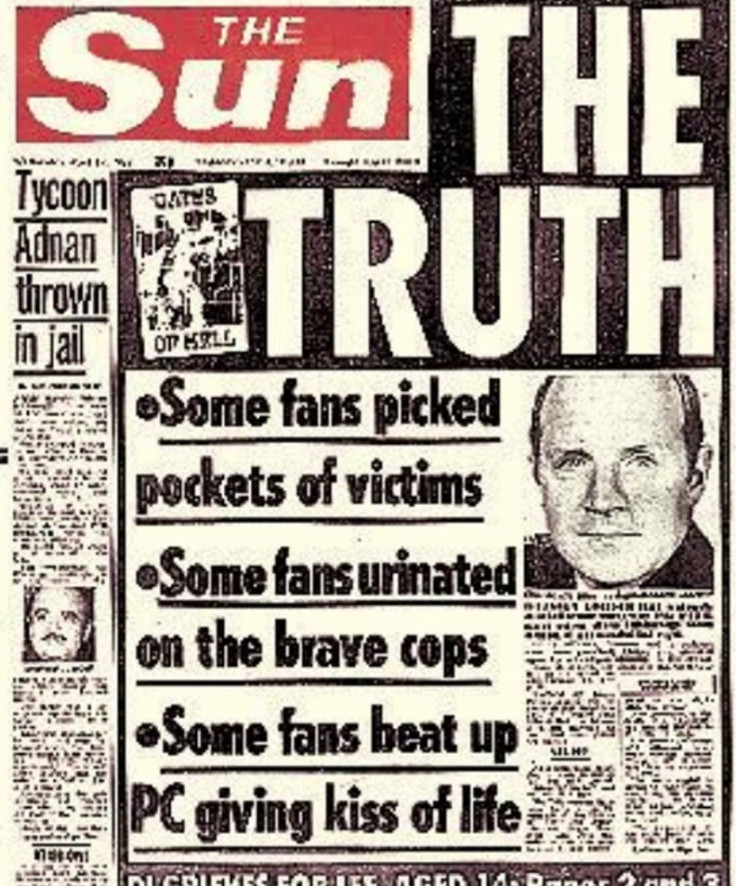Leveson Report showed only the tip of the iceberg on tabloid abuse of the press
The reminder that the Hillsborough inquiry gave us of the appalling role that The Sun played in the trauma and heartbreak of the families of the victims is a good moment to remember that it is (amongst other Fleet St Goliaths) The Sun that insists that it be permitted to regulate itself.
Not only was its front page story on 19 April 1989 – four days after the disaster – appallingly insensitive and irresponsible, but the Sun then continued for years to insist that it was justified in publishing "The Truth", until it emerged that it had merely taken copy from an agency and published it almost verbatim. I once shared a platform with its then-editor, Kelvin MacKenzie, for a media debate. When asked if he had ever considered what impact an article might have on its subject he said "no".
It was after the serial abuse by The Sun's publisher of the fundamental human rights of a small army of individuals, the bribing of the police and other public officials, followed by long period of denial and cover up, that the Leveson inquiry was commissioned to establish what was the extent of the wrongdoing by the British press (primarily the tabloid end) and what should be done about it.

A judge has decided this week that the cases of four individuals who allege that their phones were hacked by the Sun can take their claims forward following years of denial by the Sun that it had been involved in phone hacking.
Any lawyer (such as me) who has fought the tabloids over their serial human rights violations will know that Lord Justice Leveson merely uncovered the tip of an iceberg. In my own practice I have encountered wrongdoing by the British tabloid press which is even worse than that which was brought to light by the Leveson inquiry.
At the conclusion of the Leveson inquiry, during which the press were represented by a small army of QCs and barristers who were set against one barrister representing all the victims, Lord Leveson made modest, balanced and carefully considered recommendations for the future regulation of the press. Essentially it was a further form of self-regulation (despite the fact that the press's previous three efforts had all ended in abject failure), with the lightest form of statutory underpinning. This meant that there would be a statutory body which would merely oversee and report on how the fourth incarnation of self-regulation was working.
This was hysterically and mendaciously characterised by the press as a form of "state regulation". As the press well knew, it was nothing of the sort. The suggestion (for example) that the regulation of the broadcast media by Ofcom has the effect of sparing politicians from being monstered by radio and television interviewers is absurd. As one senior television lawyer said during the course of a Leveson debate that I attended, the fact that his channel was regulated by Ofcom did not in any way affect any editorial decision.
In my own practice I have encountered wrongdoing by the British tabloid press which is even worse than that which was brought to light by the Leveson inquiry.
As the press well knew, the only issue of any importance post the Leveson inquiry was who was going to regulate the press. It was an issue which brought rare political unanimity, as in the wake of the revelations of just how appallingly the press had behaved there was almost complete unanimity in Parliament that the Leveson proposals should be adopted. David Cameron also gave a solemn promise to victims to adopt the Leveson recommendations – one which he has broken.
The press realised that their best tactic was to create a new regulator which was more or less identical to its failed predecessor but with one or two bells and whistles, and then unite behind it; and so the Independent Press Standards Organisation was born. Like its predecessor (the Press Complaints Commission) it was created by the press, funded by the press, its personnel appointed by the press, its code written by the press, and has press delegates in the form of ex-editors on the commission. Just as was the PCC it has been hailed by the press as a "tough new regulator". It was given the theoretical power to levy fines of £1m; though the small print ensured that there was no conceivable way such a fine would ever be levied.
On the issue of press regulation, just as in my last article about injunctions, we see the triumph of power over the democratic process. Not only that; all the opinion polls make it clear that the vast majority of the UK public want the press to be regulated by a Leveson-compliant body. Fleet Street therefore exerts its power not only over the public's elected representatives, but the very will of the public itself.
Jonathan Coad is a Partner in the Lewis Silkin's Creative World team. He acts for both Claimants and Defendants. Follow him on Twitter: @jonathan_coad
© Copyright IBTimes 2025. All rights reserved.






















